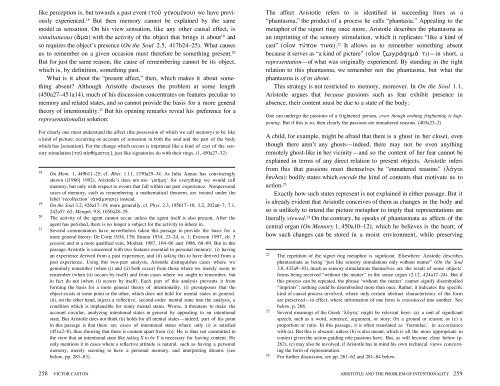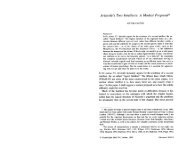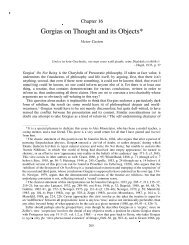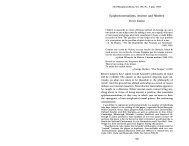Aristotle and the Problem of Intentionality. - Ancient Philosophy ...
Aristotle and the Problem of Intentionality. - Ancient Philosophy ...
Aristotle and the Problem of Intentionality. - Ancient Philosophy ...
You also want an ePaper? Increase the reach of your titles
YUMPU automatically turns print PDFs into web optimized ePapers that Google loves.
like perception is, but towards a past event (toË genom°nou) we have previouslyexperienced. 18 But <strong>the</strong>n memory cannot be explained by <strong>the</strong> samemodel as sensation. On his view sensation, like any o<strong>the</strong>r causal effect, issimultaneous (ëma) with <strong>the</strong> activity <strong>of</strong> <strong>the</strong> object that brings it about 19 <strong>and</strong>so requires <strong>the</strong> object’s presence (On <strong>the</strong> Soul 2.5, 417b24–25). What causesus to remember on a given occasion must <strong>the</strong>refore be something present. 20But for just <strong>the</strong> same reason, <strong>the</strong> cause <strong>of</strong> remembering cannot be its object,which is, by definition, something past.What is it about <strong>the</strong> “present affect,” <strong>the</strong>n, which makes it about somethingabsent? Although <strong>Aristotle</strong> discusses <strong>the</strong> problem at some length(450a27–451a14), much <strong>of</strong> his discussion concentrates on features peculiar tomemory <strong>and</strong> related states, <strong>and</strong> so cannot provide <strong>the</strong> basis for a more general<strong>the</strong>ory <strong>of</strong> intentionality. 21 But his opening remarks reveal his preference for arepresentationalist solution:For clearly one must underst<strong>and</strong> <strong>the</strong> affect (<strong>the</strong> possession <strong>of</strong> which we call memory) to be likea kind <strong>of</strong> picture, occurring on account <strong>of</strong> sensation in both <strong>the</strong> soul <strong>and</strong> <strong>the</strong> part <strong>of</strong> <strong>the</strong> bodywhich has [sensation]. For <strong>the</strong> change which occurs is imprinted like a kind <strong>of</strong> cast <strong>of</strong> <strong>the</strong> sensorystimulation [toË afisyÆmatow ], just like signatories do with <strong>the</strong>ir rings. (1, 450a27–32)18 On Mem. 1, 449b11–25; cf. Rhet. 1.11, 1370a29–34. As Julia Annas has convincinglyshown ([1986] 1992), <strong>Aristotle</strong>’s does not use ‘mnÆmh’ for everything we would callmemory, but only with respect to events that fall within our past experience. Nonpersonalcases <strong>of</strong> memory, such as remembering a ma<strong>the</strong>matical <strong>the</strong>orem, are treated under <strong>the</strong>label ‘recollection’ (énãmnhsiw) instead.19 On <strong>the</strong> Soul 3.2, 426a17–19; more generally, cf. Phys. 2.3, 195b17–18; 3.2, 202a6–7; 7.1,242a57–62; Metaph. 9.8, 1050a28–29.20 The activity <strong>of</strong> <strong>the</strong> agent cannot occur unless <strong>the</strong> agent itself is also present. After <strong>the</strong>agent has perished, <strong>the</strong>re is no longer a subject for <strong>the</strong> activity to inhere in.21 Several commentators have never<strong>the</strong>less taken this passage to provide <strong>the</strong> basis for amore general <strong>the</strong>ory: De Corte 1934, 176; Simon 1934, 23–24, n. 1; Everson 1997, ch. 5passim; <strong>and</strong> in a more qualified vein, Modrak 1987, 104–06 <strong>and</strong> 1986, 68–69. But in thispassage <strong>Aristotle</strong> is concerned with two features essential to personal memory: (i) havingan experience derived from a past experience, <strong>and</strong> (ii) taking this to have derived from apast experience. Using this two-part analysis, <strong>Aristotle</strong> distinguishes cases where wegenuinely remember (when (i) <strong>and</strong> (ii) both occur) from those where we merely seem toremember (when (ii) occurs by itself) <strong>and</strong> from cases where we ought to remember, butin fact do not (when (i) occurs by itself). Each part <strong>of</strong> this analysis prevents it fromforming <strong>the</strong> basis for a more general <strong>the</strong>ory <strong>of</strong> intentionality. (i) presupposes that <strong>the</strong>object exists at some point or <strong>the</strong> o<strong>the</strong>r, which does not hold for mental states in general.(ii), on <strong>the</strong> o<strong>the</strong>r h<strong>and</strong>, injects a reflective, second-order mental state into <strong>the</strong> analysis, acondition which is implausible for many mental states. Worse, it threatens to make <strong>the</strong>account circular, analyzing intentional states in general by appealing to an intentionalstate. But <strong>Aristotle</strong> does not think (ii) holds for all mental states—indeed, part <strong>of</strong> his pointin this passage is that <strong>the</strong>re are cases <strong>of</strong> intentional states where only (i) is satisfied(451a2–8), thus showing that <strong>the</strong>re is content apart from (ii). He is thus not committed to<strong>the</strong> view that an intentional state like taking X to be Y is necessary for having content. Heonly mentions it in cases where a reflective attitude is natural, such as having a personalmemory, merely seeming to have a personal memory, <strong>and</strong> interpreting dreams (seebelow, pp. 281–83).The affect <strong>Aristotle</strong> refers to is identified in succeeding lines as a“phantasma,” <strong>the</strong> product <strong>of</strong> a process he calls “phantasia.” Appealing to <strong>the</strong>metaphor <strong>of</strong> <strong>the</strong> signet ring once more, <strong>Aristotle</strong> describes <strong>the</strong> phantasma asan imprinting <strong>of</strong> <strong>the</strong> sensory stimulation, which it replicates “like a kind <strong>of</strong>cast” (oÂon tÊpon tina). 22 It allows us to remember something absentbecause it serves as “a kind <strong>of</strong> picture” (oÂon zvgrãfhmã ti)—in short, arepresentation—<strong>of</strong> what was originally experienced. By st<strong>and</strong>ing in <strong>the</strong> rightrelation to this phantasma, we remember not <strong>the</strong> phantasma, but what <strong>the</strong>phantasma is <strong>of</strong> or about.This strategy is not restricted to memory, moreover. In On <strong>the</strong> Soul 1.1,<strong>Aristotle</strong> argues that because passions such as fear exhibit presence inabsence, <strong>the</strong>ir content must be due to a state <strong>of</strong> <strong>the</strong> body:One can undergo <strong>the</strong> passions <strong>of</strong> a frightened person, even though nothing frightening is happening.But if this is so, <strong>the</strong>n clearly <strong>the</strong> passions are enmattered reasons. (403a23–2)A child, for example, might be afraid that <strong>the</strong>re is a ghost in her closet, eventhough <strong>the</strong>re aren’t any ghosts—indeed, <strong>the</strong>re may not be even anythingremotely ghost-like in her vicinity—<strong>and</strong> so <strong>the</strong> content <strong>of</strong> her fear cannot beexplained in terms <strong>of</strong> any direct relation to present objects. <strong>Aristotle</strong> infersfrom this that passions must <strong>the</strong>mselves be “enmattered reasons” (lÒgoinuloi): bodily states which encode <strong>the</strong> kind <strong>of</strong> contents that motivate us toaction. 23Exactly how such states represent is not explained in ei<strong>the</strong>r passage. But itis already evident that <strong>Aristotle</strong> conceives <strong>of</strong> <strong>the</strong>m as changes in <strong>the</strong> body <strong>and</strong>so is unlikely to intend <strong>the</strong> picture metaphor to imply that representations areliterally viewed. 24 On <strong>the</strong> contrary, he speaks <strong>of</strong> phantasmata as affects <strong>of</strong> <strong>the</strong>central organ (On Memory 1, 450a10–12), which he believes is <strong>the</strong> heart; <strong>of</strong>how such changes can be stored in a moist environment, while preserving22 The repetition <strong>of</strong> <strong>the</strong> signet ring metaphor is signficant. Elsewhere <strong>Aristotle</strong> describesphantasmata as being “just like sensory stimulations only without matter” (On <strong>the</strong> Soul3.8, 432a9–10), much as sensory stimulations <strong>the</strong>mselves are <strong>the</strong> result <strong>of</strong> sense objects’forms being received “without <strong>the</strong> matter” in <strong>the</strong> sense organ (2.12, 424a17–24). But ifthis process can be repeated, <strong>the</strong> phrase ‘without <strong>the</strong> matter’ cannot signify disembodied“imprints”; nothing could be disembodied more than once. Ra<strong>the</strong>r, it indicates <strong>the</strong> specifickind <strong>of</strong> causal process involved, where only certain abstract characteristics <strong>of</strong> <strong>the</strong> formare preserved—in effect, where information <strong>of</strong> one form is transduced into ano<strong>the</strong>r. Seebelow, p. 268.23 Several meanings <strong>of</strong> <strong>the</strong> Greek ‘lÒgow’ might be relevant here: (a) a unit <strong>of</strong> significantspeech, such as a word, sentence, argument, or story; (b) a ground or reason; or (c) aproportion or ratio. In this passage, it is <strong>of</strong>ten translated as ‘formulae,’ in accordancewith (a). But this is obscure, unless (b) is also meant, which is all <strong>the</strong> more appropriate incontext given <strong>the</strong> action-guiding role passions have. But, as will become clear below (p.262), (c) may also be involved, if <strong>Aristotle</strong> has in mind his own technical views concerning<strong>the</strong> form <strong>of</strong> representation.24 For fur<strong>the</strong>r discussion, see pp. 261–62 <strong>and</strong> 281–84 below.258 VICTOR CASTONARISTOTLE AND THE PROBLEM OF INTENTIONALITY 259





